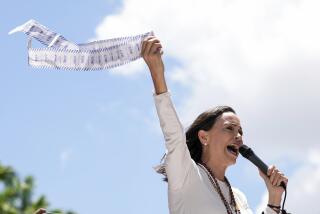Ecuadoreans Defy Suspension of Civil Liberties; Decree Lifted
- Share via
QUITO, Ecuador — After thousands of protesters took to the streets Saturday in defiance of a state of emergency he had imposed the day before, President Lucio Gutierrez yielded to the demonstrators and lifted the decree.
Gutierrez suspended civil liberties in this capital city late Friday after three nights of protests against his rule. On Saturday, the order was largely ignored. The mayor of Quito, a key opposition leader, called on residents to disobey the state of emergency, which suspended freedom of speech and the right to assembly.
“The people cannot live as they are today, in a dictatorship,” Mayor Paco Moncayo said. “Instead of correcting his mistakes, the president has only created more chaos.”
Opposition to Gutierrez, a former army colonel, has grown since December, when the president and his congressional allies purged the Supreme Court of justices who had supported a failed attempt to have him impeached on corruption charges.
After the purge, the president stacked the court with his allies. In his speech Friday suspending civil liberties, the president also dismissed all 31 of the high court’s justices in a concession to the opposition.
The president of Congress announced Saturday night that there would be a special session today to discuss the law covering the appointment of Supreme Court justices and the future composition of the court.
In his televised message Friday, Gutierrez said he was dissolving the court because it had been constituted only as a temporary measure and it was time to move on. “Beloved people of Ecuador, let’s now leave everything in God’s hands,” he said.
Gutierrez said he was suspending civil guarantees “because of the state of internal commotion” caused by the demonstrations, which on Friday saw 15,000 residents of Quito banging pots and pans in a traditional form of middle-class protest.
Ecuador’s top military commanders appeared together on television early Saturday to back the move.
“The state of emergency decree is not an attack on any citizen. It does not seek to pit brother against brother,” said Vice Adm. Victor Hugo Rosero, the head of Ecuador’s joint chiefs of staff. “Its only purpose is to recover the order and peace lost in these last days.”
But Vice President Alfredo Palacio denounced Gutierrez for having made the country a “dictatorial state.” At midday Saturday, about 10,000 protesters gathered on Shyris Avenue in northern Quito and other points to defy the state of emergency.
“This government has violated all of our rights as citizens,” said Gabriela Espinoza, 23, who held a sign that said “Fuera Lucio!” (Lucio out).
Many of the demonstrators waved Ecuadorean flags and drove the city streets honking horns.
“I never imagined I would see this many people out on the streets and that they would keep it up for so many days,” said Santiago Proano, a 40-year-old businessman who came to the demonstration with his two sons.
Police and military forces largely ignored the protesters, although there was a strong military presence near some government buildings. There were no reports of arrests.
Ecuador has a recent history of coups. Gutierrez himself helped overthrow the government in 2000, when he was an army colonel, but was later arrested by the new government for his role in the uprising.
On Saturday, Quito was swept with rumors of an impending coup, but military leaders quickly denied them. Gen. Luis Aguas, who leads Ecuador’s army, said his troops would take action only when public order was threatened.
Gutierrez was elected Ecuador’s president in 2002 with strong support from the country’s Indian population, but many indigenous leaders have since broken with him. The president also enjoyed the support of a majority of members of Congress when he first dissolved the Supreme Court.
But the president has since lost that majority. His popularity has dipped as he has cut social programs as part of a fiscal austerity program aimed at curbing the country’s debt.
Juan Carlos Rodriguez, a 38-year-old technician, said he joined the protesters because he felt the president had failed to deliver on his campaign promises, which embraced leftist slogans and themes.
“Now he is handing over the country to the corrupt mafia of Ecuador,” Rodriguez said.
In an interview with Reuters news agency in his presidential palace hours before declaring the state of emergency, Gutierrez said opposition to his government was confined largely to Ecuador’s capital city.
“At this time, most of the political conflict is in the city of Quito,” he said. “In the rest of the country they have a different outlook, they’re pretty calm, and in some cases even happy.”
Times staff writer Tobar reported from Buenos Aires and special correspondent Perez from Quito.
More to Read
Sign up for Essential California
The most important California stories and recommendations in your inbox every morning.
You may occasionally receive promotional content from the Los Angeles Times.











